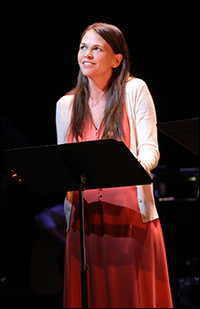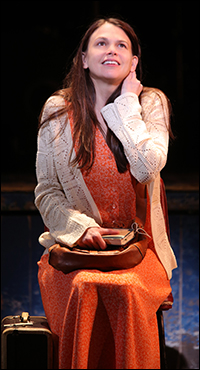
*
Jeanine Tesori's baby is all grown up. Seventeen years after her first musical opened Off-Broadway at Playwrights Horizons, Violet, which features music by Tesori and a book and lyrics by Brian Crawley, is now making its Broadway debut.
"The baby is going to college," said Tesori, whose stage composing credits include A Free Man of Color, Shrek the Musical, Caroline or Change, Thoroughly Modern Millie and Fun Home.
Based on Dorris Betts' short story "The Ugliest Pilgrim," which Tesori first discovered as a movie on Showtime in the 80s, Violet follows a young Southern woman who embarks on a bus trip seeking the help of a TV evangelist whom she hopes can heal a large facial scar that is the result of a tragic childhood accident. The original Off-Broadway cast featured Lauren Ward, Michael Park and Michael McElroy; the Broadway production, directed by Leigh Silverman, features two-time Tony winner Sutton Foster, Colin Donnell and Joshua Henry.
Violet recently received four Tony Award nominations: Best Musical Revival, Best Director (Silverman), Best Actress in a Musical (Foster) and Best Featured Actor in a Musical (Henry). Tesori chatted with Playbill.com about Violet's long journey to Broadway.
You wrote Violet while living in a lighthouse. Please tell me that story.
Jeanine Tesori: I was a conductor, and I was trying to figure out what the next plan was going to be. I saw my life sort of in the next phase. Being a sideman is really grueling work. I think a lot of people don't realize what it's like to play eight shows a week in the dark, wearing black, not being seen, only being heard. It's really hard on your body, that kind of repetition. It's a great gig, but it's grueling. It's mentally hard to do the same thing, time after time after time. I wanted to know what was going to be next. Then with the help of my mentor, who encouraged me to go for a Plan B... He said, "If you're not going to go for it now, what are you waiting for?" I thought, "What am I waiting for? What am I so scared of?"
I knew the town of Westport, NY, very well because I had done theatre up there, and I'd made a couple of very dear friends. I gave three months notice at the show I was with, called up there and they said, "The only house we know of that's available right now is the lighthouse that's privately owned." I said, "I don't care. I'll take it." It was $300 a month. It's absolutely isolated. That was the year there were 15 snowstorms, so I was snowed in much of the time. I brought up a piano and laser discs to study, scores and books and paints. I wanted to know what I was going to do when I didn't have time, how I was going to combat loneliness — all that stuff that you need to know, I think, when you're a writer.
I'd never taken a shot at writing full time. I thought, "If I'm going to eat Nestle Crunch bars the whole time, I'd better find out now." I remember thinking that I was built for it when I'd been up there for a few months and someone said, "What channels do you get on the TV?" and I said, "I don't know. I haven't turned it on." That was a clue for me.
 |
||
| Sutton Foster in Violet at City Center |
||
| Photo by Joan Marcus |
JT: I looked forward to revisiting it in New York without the pressure of having to do anything except present it. I had no agenda behind it; I also didn't really want to do it. I had not imagined that I would be doing one of my own pieces in the first season of Off-Center. I thought, "OK, but only a concert. I don't want to get back into all of it."
We have such incredible memories of the original cast. It was such an important beginning for so many of our careers — Michael McElroy, Lauren Ward... they had done work before that but [Brian and I] got to write those parts for them.
Violet was a two-act musical when it played Playwrights Horizons, and it's been shortened to one act for Broadway. How did you go about making that decision?
JT: As a composer, I was guessing so much in those days. I still guess, but instead of 20 tries, I can sometimes get there in 10. They were so patient and so great. And then when Sutton started singing through the score, I thought, "Oh. This is a way. This is a new old way of getting to that." This character is so part of Sutton in there somehow. I guess I hadn't even thought of that. I had asked Sutton to be part of the Off-Center season a year prior, without any decisions having been made about content. It's completely serindipitious that it's happened this way.
When Brian and I were first working on it, it was a one act. Then we switched to two acts as we were flushing out the story. But our first impulse was to make it a one act. And when I was talking to Leigh, she said we should do this in one. I said that's so interesting; that's how it was originally. We did it in concert form; we ended up cutting a lot. The pace benefited from it, and we tried to get rid of anything that we thought wasn't necessary for us or for the audience or the characters.
We're still working on it; we've written a considerable amount of new material — after 17 years, well, 17 years worth of lessons learned. And at the same time, we're trying to keep what it is, and that's a first work. I don't want to rewrite it to the point that you can't recognize it. I wanted to bring out what we were going for back then. And I'll speak for myself — I didn't have enough craft to really understand what I was doing all the time.
 |
||
| Sutton Foster in Violet on Broadway |
||
| Photo by Joan Marcus |
JT: I think that I was reading "The Autobiography of a Face." I think it's something that I struggled with for a really long time. When I was little, I got glasses when I was two and my hairline basically started with my eyebrows. I was so sensitive about how I looked, and it's since come out that almost everybody has a gap between what their identity is and what their essence is and how people see them and how they would like to be seen and how they feel they are seen. It's something that I think I've explored for a long time, based on my own struggles. And now having a daughter... When I wrote Violet, I was pregnant, and now my daughter is 16, and I watch her navigating that in the world as a young woman... I'm not sure if it's a statement as much as something that interests me. I like to grapple with things and try to find out what the truth of a character is inside.
The idea of physical beauty has changed a lot since Violet was first performed Off-Broadway, and beauty standards are receiving a great deal of attention right now.
JT: I think that there is a specificity to beauty now which wasn't true when I was a kid. A number of people were just starting to get nose jobs, and it was really only for people who really were suffering from the fact that they just didn't feel like themselves. And now it just feels like an a la carte menu. You can just get this and this, and you can order this and this and create something. There's so much possibility to look different that it's frightening to me, because I don't know how you can ignore them.
With HD... those pictures that make sure they capture the angle so that an actor or actress' thighs look dimpled — it's so sickening to me. The body is the greatest musical ever. It's such a miracle. I'm the daughter of a doctor, and he had his practice in our house. And I saw a lot of people whose bodies were broken come in that door. I think that's just taken for granted so much right now because you have this choice of: It's just not enough. It has to be this-er — "er" on the end of everything. I think in this context it's very interesting to see this whole new context for a show with this message.
You've written some really strong, fascinating female characters — Millie, Princess Fiona, Violet, Alison... How do you choose your projects?
JT: Violet was the only thing that I've gone after and gotten the rights for. Other things have come to me. I've been incredibly grateful and lucky. If I find myself in it, I'll take it. If I know that it sings, then I'll write it. If I know it's going to be four to five years and there's an equal chance that it will not work to the fact that it will work, and if I feel like I have the impulse, I have this inkling that it's worth it, then I'll say yes to it. I think I don't think of [characters] as women and men. I think of them as characters first who really want something and are going to be, I hope, compelling to watch on stage.
(Carey Purcell is the Features Editor of Playbill.com. Her work appears in the news, feature and video sections of Playbill.com. Follow her on Twitter @PlaybillCarey.)

























